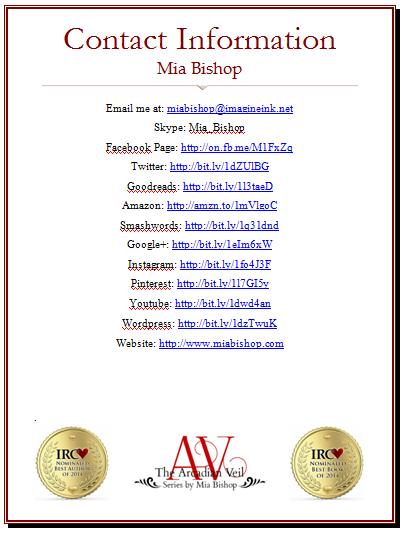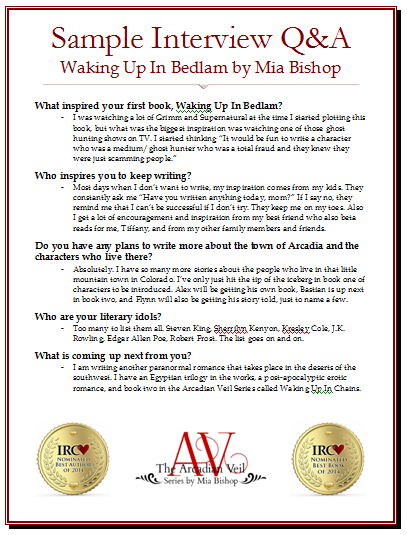So what is a Media Kit and why is it important?
Go to any of the web pages I’m linking to down below and
they will go over how important a Media Kit is. It is a major marketing
package. It helps people promote your book without you having to do anything.
Journalists expect to see one if they visit your website or blog. Most
importantly it puts out the information, correctly, that you want people to
have.
Why is that important?
Here’s a scenario: Let’s say a blogger is doing a review,
it’s 2 am and guess what, they forgot to ask and you forgot to send your bio to
them, it’s too late for them to contact you now about it so they go to your
website and look for a media kit (now, if you have one, you probably should
have sent it but you know, mistakes happen) so they go to your site and you
don’t have a MK available. So that blogger now has three choices: scrap the
whole review, scrap any sort of bio which helps promote not just your book but
your brand as well, or they decided to just make a quick bio for you. At best
the bio will be bland and uninteresting and at worst they could get some
information horribly wrong. If you had a Media Kit there they could have
downloaded it, copy and pasted what they needed, and the whole thing would have
went off without a hitch.
Now as a Hybrid Author with only two books and one short
story anthology out I don’t have journalists or bloggers banging on my door
night and day looking for easy access to my info, but if any of them do happen
to swing by my blog I want to make sure any info I can provide them is readily
available.
By and large a Media Kit is a helpful tool for branding and
marketing, but it is always offered first, never sent unsolicited. That’s not
to say if someone is doing a review for you that you shouldn’t include your
Media Kit, you totally should. But don’t just start sending out your Media Kit
willy-nilly to every blogger you find without them even showing an ounce of
interest in you first.
Now, I’ve combed over sites explaining how to make a media
kit, I’ve attended a webinar on the subject, I’ve highly considered shelling
out money for some Media Kit Templates (but in the end I didn’t have it in the
budget), and I’ve poured over other author’s Media Kits to see what I liked and
what I didn’t like.
Some people tell you that you only need a book synopsis and
an author bio. Other people say you need a separate .doc for every thing in the
kit: Bios (tiny, small, medium, large), a Press Release, Sample Interview
Questions, Sample Chapter, Contact Information. Others go even further by
saying you need to have an introduction for when you are speaking at an event,
Book Review Excerpts, And a .doc specifically for photos of you (color and
black and white head shots, plus color and black and white candid’s. Maybe
something with your dog? You out fishing?) You can even find a PicMonkey
tutorial on making a Media Kit on the photo editing site. Possibilities are
endless and overwhelming.
For my approach I took what was relevant to me. I don’t have
hundreds of book reviews to warrant having a page of book reviews excerpts in
my Media Kit. Nor do I have professional head shots to fill up a photo .doc in
my Media Kit. I have yet to master how to write up a decent Press Release so
rather than embarrass myself, I figured I’d leave that out as well. Public
speaking isn’t in my near future (maybe one day) so that could be cut as well.
What I do have is a synopsis, bios (a twitter bio, a small,
and a large), a sample chapter (obviously), my contact information, and I even
sat around and thought up some sample interview questions and answers.
I guess we better address that one real quick.
Why sample interview questions? Because sometimes you might
get asked to appear on a podcast, radio interview, or get asked to do an online
interview, but the person interviewing you might not have the time to actually
sit down and read your book (shocking, I know) so this helps them. It says
“hey, you might not have read my book but here are some questions you can ask to
make you look good and I’ve already answered them so you know what I’m going to
say ahead of time.” Easy-peasey. A Media Kit is all about making the
blogger/journalist/interested party’s life easier. The easier you make their
life, the more chances they might give you in the future to help expand your
brand and marketing.
Now that we’ve got that covered, let’s get back on track.
Should it look all prettied up? Well it certainly shouldn’t look boring, but
not too much because you don’t want it to look gaudy. That is strictly from a
graphic design stand point. A simple boarder, maybe a drop shadow to help it
stand out, place in a logo if you’ve got one, maybe some badges if you got
those too. Now, if you are doing them all individually then by all means put
these on every page, but if you are compiling them and you are using graphics
that take up a lot of space you might consider using your images on the first
page and then possibly the last. You don’t want to distract on every single
page of your sample chapter with your logos and what not.
So how do mine look? Here’s some screen shots of each of my
files separately:
Synopsis (note I put hyperlinks in my files which include the
buy links):
Sample Chapter:
Bio:
Contact Information:
Sample Interview Q&A:
Here’s a look at my completely assembled Media Kit for
Waking Up In Bedlam (which includes Synopsis w/buy links, Bio, Contact
Information, and Sample Chapters of WUIB with the buy links again at the
bottom:
(notice my award nomination badges and my logo are only on the first and last page when it's all put together, because having them on every page would be distracting)
-Here’s a little note I wanted to add about my author
picture. Everyone will tell you to use a professional picture (also called a
head shot). I don’t have a head shot, and I am a very camera shy person. So I
choose to put in a picture of me looking like I normally do. If you saw a head
shot of me you wouldn’t recognize me. I don’t generally dress up, I can’t put
on a forced-smile to save my soul, and honestly if you saw me at a convention I
would want you to recognize me. This is me, it is who I am, I’m not a doll, I
don’t play dress up. A little bit of lip gloss is pretty much the only makeup
you’ll see me in, and usually I’ll be a t-shirt that shows one of my many
fandom obsessions and my rather oversized sunglasses. Add in my headphones and
a beanie, and that is me. So it was my choice, to include a picture that shows
me as me, not me as something I’m not. One of these days I’ll get head shots
done, I’ll find a photographer who understands I can not smile on cue and will
be able to find a way to get a genuine smile by catching me off guard. Until then,
I’d rather just be me and honestly I am tired of hiding that. <3
Now if you’d like to use my Media Kit as a template for your
own feel free to click here and download them from my blog and enjoy.
Web pages to help you construct a Media Kit of your own:
(Just do a google search for “how to make an author media
kit' and you will have information for days and days)
Do you use a Media Kit? If so, have you found it has helped
you in your marketing? If you are a review blogger do you like having a Media
Kit included with the book you are reviewing? Let us know in the comments.





